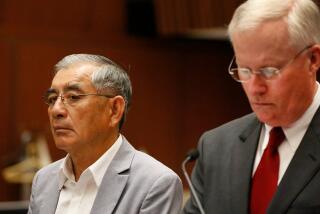Gaming Figure Took Funds, State Says
- Share via
SACRAMENTO — State investigators have accused Bicycle Club founder and part owner George Hardie of committing a number of civil violations, including skimming $11 million in club profits, placing in jeopardy the longtime gaming impresario’s license to operate.
Seven violations against Hardie are contained in a brief prepared for Atty. Gen. Dan Lungren by Department of Justice officials and filed last week. Lungren is authorized to revoke Hardie’s license and in effect throw him out of the gaming business in California if he finds the charges supportable, a spokesman said.
The accusation, prepared by the Gaming Registration Program unit in the state Department of Justice, charges that Hardie joined forces with the Bicycle Club’s manager of Asian games, Hollman Cheung, and between 1985 and 1994 pocketed half of Cheung’s share of the net profits.
No criminal charges are involved in the complaint against Hardie. A spokesman for Lungren would not comment on whether a criminal investigation is under way.
Cheung was convicted of loan-sharking and extortion stemming from lines of credit he extended to gamblers at the club, and last year was sentenced to 12 1/2 years in federal prison.
The card club, located in Bell Gardens and one of the largest in the state, was taken over in part by the federal government in 1990 as an asset seizure arising out of a drug and money-laundering investigation. Hardie was not involved and was allowed to retain his interest and operate for a time as its manager.
Hardie, who has often quarreled with the club’s federal trustees and resigned as general manager last year, denied the accusations and said they amounted to “government persecution.”
Known throughout Southern California and Nevada for various gambling ventures, Hardie said he believes “very strongly the federal government is involved here and prodded the [state officials] to do this.”
He said in a telephone interview that he “absolutely” will contest the decision if Lungren revokes his gaming license. “The charges are just wrong,” he said.
All owners and managers of card rooms are licensed by the state after background checks.
The Bicycle Club is a heavy contributor to state lawmakers and the major political parties. Records show that from February, 1993, through the end of last year, the club contributed $329,000 to 66 Democratic and Republican legislators or to their political parties.
Among the license violation accusations against Hardie were:
* He kept Cheung on as Asian games manager even though Cheung was not, but should have been, licensed by the state and “knew or should have known” about Cheung’s arrest on charges of defrauding investors in a gold company.
* Hardie and Cheung “entered into a . . . secret agreement whereby [Hardie] would receive a kickback amounting to 50% of Cheung’s share” of club profits. The kickbacks were concealed “through a series of three fraudulent consulting contracts” between Cheung and companies owned by Hardie. The payments amounted to about $11 million over seven years.
* On several occasions, Hardie violated federal income tax reporting requirements by mixing markers, cash and chips of high-rollers to disguise income, or instructed employees to do so, and sought to cover up the proceeds by having employees make bank deposits in amounts less than the $10,000 minimum that triggers an investigation.
* Hardie failed to report in his gaming license application that he was arrested on suspicion of rape in the 1960s. The charge was dropped, but he was required to report the arrest.
* When an apparent drug deal was discovered at the Bicycle Club in 1993, Hardie instructed security personnel to keep “hands off” because a favored customer was involved.
More to Read
Sign up for Essential California
The most important California stories and recommendations in your inbox every morning.
You may occasionally receive promotional content from the Los Angeles Times.













